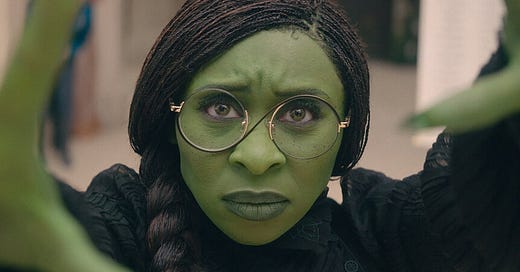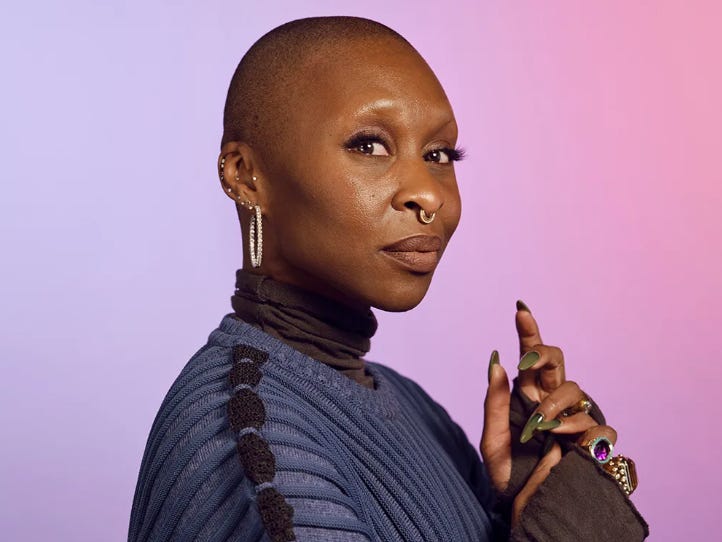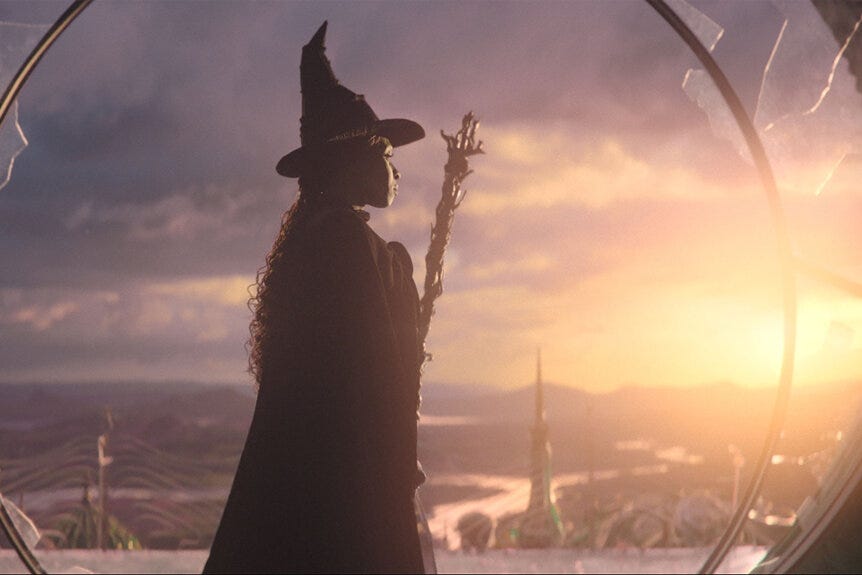Last week, I took myself off to the cinema to see Wicked. I was curious but far from a devoted fan. Having seen the West End production before, I found it enjoyable and appreciated its themes, but, for one reason or another, it hadn’t left a lasting impression. This time, however, I was unashamedly blown away.
A Broadway musical, and now a film, Wicked (2024) reimagines the backstory of the witches from The Wizard of Oz. It tells the story of Elphaba, born with green skin, who is misunderstood, shunned, and branded the "Wicked Witch of the West."
Musicals have long been fascinated with bodily difference. From The Phantom of the Opera (and its sequel, Love Never Dies … don’t ask) to Disney’s Beauty and the Beast and The Hunchback of Notre Dame, there’s a surprising abundance of show tunes about having an anomalous face. However, these songs are all rather similar and could easily be summed up by someone mournfully bellowing the word “solitude.”
While these works certainly know how to be “pop-u-lar,” they all follow the same formula: sorrowful songs sung by characters “burdened” by their appearance, and redemption contingent on being “fixed” or loved despite their difference. Wicked, however, unlike its predecessors, offers a refreshing and empowering take on the experience of difference.
From its opening scenes, I felt an almost visceral sense of recognition. Elphaba’s story is one of societal rejection, a mirror to my own experiences as someone who has a facial disfigurement. Like her, I have faced stares, judgments, and the constant burden of proving my humanity in a world that sees my cleft lip and palate as flaws. For a campy story about a green witch, Wicked serves as a surprisingly powerful allegory for facial discrimination.
Monstering and Otherness
Elphaba’s green skin marks her as “other” from birth, a visible and inescapable sign of her difference. However, unlike the Phantom, the Beast, or Quasimodo, Elphaba's story isn’t about seeking redemption or acceptance from others; it’s about reclaiming her identity in a world that insists on misunderstanding her.
Elphaba doesn’t just represent feeling “different”; she embodies what it means to be culturally monstered. She is blamed for things far beyond her control, demonised for standing out, and ostracised for daring to challenge the status quo. When the people of Oz turn on her, it is declared:
“Her green skin is but an outward manifestation of her twisted nature!”
This perfectly encapsulates how facial disfigurement is treated. Popular culture perpetuates the idea that anomalous faces are synonymous with evil. It stems from the idea that our face defines who we are, so if our face is considered ‘unusual’ or ‘bad,’ then so are we. Villains are frequently "monstered" through their appearance, reinforcing harmful stereotypes and creating real-world consequences for those who look “too different.”
Research by the charity Changing Faces in 2020 found that seven in 10 people with a disfigurement experienced hostile behaviour from strangers, while over a quarter were victims of hate crimes.
A Rare Representation
While I long for depictions of facial “difference” that reflect experiences like mine more directly (Aaron Schimberg’s A Different Man comes to mind), I was struck by how much Wicked resonated with me. I felt far more “seen” by a film like Wicked than I ever have watching something like The Elephant Man (1980).
While undeniably well-crafted (if arguably a bit of an arthouse cry-wank), David Lynch’s classic leans heavily on evoking pity from non-disabled, non-disfigured audiences. It seems designed to make viewers feel virtuous for shedding tears over the protagonist’s suffering, offering little for those who live such experiences daily. Its depiction of suffering keeps the audience at a distance, reducing systemic injustices to a simplistic notion of “man’s inhumanity to man.”
Wicked, by contrast, avoids making Elphaba a victim of her difference. She resists a world that marginalises her, and her journey of self-empowerment challenges the audience to confront the systems that label her “other.” It’s not about pity but about understanding and questioning societal prejudice.
Fantasy as Allegory
It’s tempting to dismiss fantasy allegories as too abstract or silly to convey meaningful weight. Yet, under the right circumstances, these stories often evoke emotions more powerfully than their “realistic” counterparts. Planet of the Apes, for instance, as Mark Kermode aptly noted, “tells you everything you need to know about politics, religion, and society.”
Wicked functions similarly. Its fantastical setting disarms the audience, allowing them to confront real-world prejudice and resilience in their rawest forms. Wicked explores the emotional truth of being marginalised and misunderstood by society. It demonstrates the connection between conspiracy, propaganda, and discrimination, showing how these are used as tools of power to control people through fear, and the courage required to resist and rise above.
For those of us who have facial disfigurements, the pain of being othered is all too real: the avoided eye contact, the stares, the disgust. Wicked shows that the problem isn’t the difference itself, but how society reacts to it.
The Universality of Elphaba
The movie’s themes of misunderstanding, prejudice, and the desire for acceptance transcend individual experiences, resonating with anyone who has ever been othered. Basically, if you’ve been traumatised by stigma and discrimination (and enjoy musicals), Elphaba’s green helps you feel seen.
That said, it’s impossible to discuss Wicked (2024) without acknowledging the significance of casting Cynthia Erivo, a Black woman, as Elphaba. In a world where beauty standards are steeped in whiteness, her green skin symbolises not just physical difference but also the racial prejudices shaping perceptions of “otherness.”
Erivo’s performance amplifies the story’s impact, highlighting the compounded experience of marginalisation based on appearance and race. Her portrayal brings vulnerability, strength, and defiance to the character, adding new dimensions to Wicked’s message of resistance and empowerment.
Defying Gravity
For me, the greatest challenge of having a facial disfigurement is learning to change how you feel, not how you look. Society encourages you to see difference as a flaw to be “fixed,” but self-acceptance requires questioning these harmful ideas. Like Elphaba, I had to stop wishing I could change my appearance and instead focus on finding strength in who I am.
Elphaba, too, longs to shed her green skin. Yet, when given the chance, she chooses to fight for justice rather than conform to societal expectations. Her choice mirrors the internal struggle many of us face in the fight for self-acceptance.
When she sings “Defying Gravity,” it becomes a rallying cry for everyone who has felt silenced or diminished. It's worlds apart from the sorrowful laments of characters like the Phantom, Quasimodo, or the Beast. It’s a declaration of self-empowerment that goes beyond just defying gravity but about defying societal expectations, refusing to shrink in the face of judgment.
Wicked, Othering, and the Power of Defiance
Ultimately, Wicked is a story about the dangers of othering and the power of reclaiming one’s identity in the face of systemic prejudice. Elphaba’s journey, rooted in her stigmatised appearance, serves as a poignant allegory for the way disfigurement and other forms of marginalisation are weaponised by society. Her green skin becomes a convenient scapegoat for the powerful, a symbol onto which Oz projects its insecurities and prejudices.
In a world where the rise of fascism and authoritarian ideologies continues to threaten the marginalised, Wicked feels eerily prescient. Through its fantastical lens, the story exposes how propaganda, scapegoating, and manufactured enemies are used to consolidate power, echoing the mechanisms of oppression we see in our own world.
But Wicked also offers hope. Elphaba’s refusal to be diminished or erased, her determination to rise above societal judgment, is a rallying cry for anyone who has been cast as “other.” Her story challenges us to resist narratives of hate, reclaim our identities, and stand against the forces that seek to divide. It reminds us that strength lies not in conformity, but in embracing who we are. It urges us not only to question the systems that perpetuate hate but also to find the courage to defy them, and, like Elphaba, to rise above.









